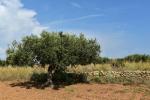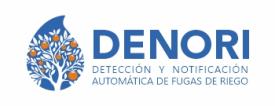ERICA Operational Group: Smart irrigation strategies for almond cultivation
- Type Operational group
- Status In progress
- Execution 2023 -2026
- Assigned Budget 134.112,00 €
- Scope Autonómico
- Autonomous community Aragón
- Main source of financing CAP 2023-2027
The ERICA project will allow almond growers to optimize water use thanks to an innovative system that measures the crop's water stress level in real time. The main result is the development of a tool that combines low-cost sensors with advanced software to calculate a reliable water stress index, facilitating more precise and efficient irrigation decisions.
Using this tool, farmers can schedule irrigation based on the actual needs of almond trees at each stage of their development. Implementing this system is a significant advantage, as it reduces water waste, improves tree health, and optimizes production by avoiding unnecessary or insufficient irrigation. Producers can use the results through a digital platform accessible from their mobile phone or computer, where they will receive automatic recommendations on the optimal irrigation dose and frequency. This will simplify water management on the farm and increase crop profitability.
A demonstration day will be held to introduce the project results to end users, thus familiarizing farmers in particular. Through this training, they will be able to learn practically how to use the developed model to maximize its potential, thus facilitating its subsequent incorporation into daily field work. Another outreach day will also be held for a wider audience, especially the agricultural sector, and will be open to researchers, students, teachers, government personnel, and others.
This project aims to help the almond sector achieve better harvests, increase productivity and crop quality, maximize resource efficiency, and reduce its environmental impact, all with a focus on sustainability. From an economic perspective, ERICA could generate a positive impact for farmers working in the 83,000 hectares dedicated to almond cultivation in Aragon. However, nationally, the results could be transferred to approximately 169,664 hectares, including farms that already have irrigation systems.
In figures, the project could save more than 112 million liters of water and more than €5.6 million annually in Aragon (almost 1,200 million liters and €60 million in Spain as a whole) just by applying it to almond cultivation. If the proposed methodology were applied to other fruit trees, these already significant savings would increase significantly.
Preliminary studies will be conducted, and techniques for assessing water stress will be reviewed. System requirements will be defined, and the most suitable devices will be selected through laboratory quality testing. In addition, the experimental design will be carried out, establishing monitoring points, irrigation treatments, and measurement protocols. In a second phase, a pilot facility will be launched to monitor the almond crop. During the growing season, key agroclimatic parameters will be monitored, and manual measurements will be taken to verify the accuracy of the measuring equipment and validate the proposed water stress index using reference methods.
Finally, in the data analysis, modeling, and validation phase, the obtained values will be integrated into an intelligent irrigation algorithm, which will allow irrigation rates and frequencies to be adjusted based on the level of water stress detected. The evolution of the index will be analyzed, and the mathematical model will be calibrated based on various crop variables. Once validated, traditional management will be compared with the new strategy, evaluating parameters such as production, biomass, and quality. The results obtained will be used to draw conclusions about the tool's effectiveness and define future improvements.
In the current context, where almond cultivation has gone from being marginal to occupying large irrigated areas, and given its growing demand for water (its water needs are expected to increase by 30% due to climate change), it is necessary to optimize the efficient use of this resource. Given this situation, the project focuses on developing a digital tool based on precision agriculture techniques such as sensors, Big Data, and IoT, which will facilitate the efficient management of water, an increasingly scarce natural resource.
- Coordinator/entity name: MONTEFRULA SL
- Postal address: FINCA MONTEFRULA SL, ALMUNIENTE, 22255, Huesca
- Coordinator/entity email: eroldan@naturalwoodycrops.com
- Telephone: 609679145
- MONTEFRULA SL
- LA PEÑA 99 SL(oscarsalafranca@gmail.com)
- MONTEFRULA SL






